10 Strategies to Navigate the Data Market Effectively

10 Strategies to Navigate the Data Market Effectively
Overview
The article titled "10 Strategies to Navigate the Data Market Effectively" provides actionable strategies for successfully engaging with the data market. It highlights the importance of utilizing platforms such as the Initial Data Offering (IDO) to access high-quality datasets. By ensuring data reliability and ethical standards, these strategies are critical for informed decision-making and effective market research.
How can these strategies enhance your approach to data? The implications of leveraging these methods are significant, offering a pathway to more reliable insights and improved outcomes in your market endeavors.
Introduction
The data market represents a complex landscape, rich with opportunities yet laden with challenges. As organizations endeavor to harness the power of data, it becomes crucial to understand how to navigate this intricate environment. This article explores ten effective strategies that empower businesses to successfully traverse the data market. These strategies range from leveraging unique datasets to ensuring data quality and ethical compliance. But how can companies not only survive but thrive amidst the ever-evolving expectations and technological advancements? Exploring these strategies may unlock significant competitive advantages in the data-driven world.
Initial Data Offering: A Central Hub for Discovering Unique Datasets
The Initial Data Offering (IDO) serves as a pivotal platform for users seeking unique data across various fields. By carefully curating high-quality information, IDO effectively connects providers and buyers, facilitating the discovery of collections tailored to specific needs. The platform boasts an intuitive interface that streamlines both browsing and dataset submission, nurturing a vibrant community where information can be exchanged effortlessly. This centralized hub not only enhances visibility but also promotes collaboration among information enthusiasts, researchers, and businesses, ultimately driving innovation and informed decision-making.
In 2025, IDO features thousands of unique datasets, including:
- Alternative Data
- Fundamentals Data
- ESG Data
These datasets empower users to leverage valuable insights across diverse sectors. How can these datasets enhance your decision-making processes? Specialists emphasize that community involvement is crucial for effective information exchange. IDO exemplifies this by fostering a cooperative atmosphere that benefits all contributors while addressing the fragmented nature of the data market.
In summary, IDO stands out as an essential tool for those looking to navigate the complex landscape of data. By bridging gaps between data providers and users, it not only enhances access to information but also cultivates a collaborative environment that drives progress and innovation.
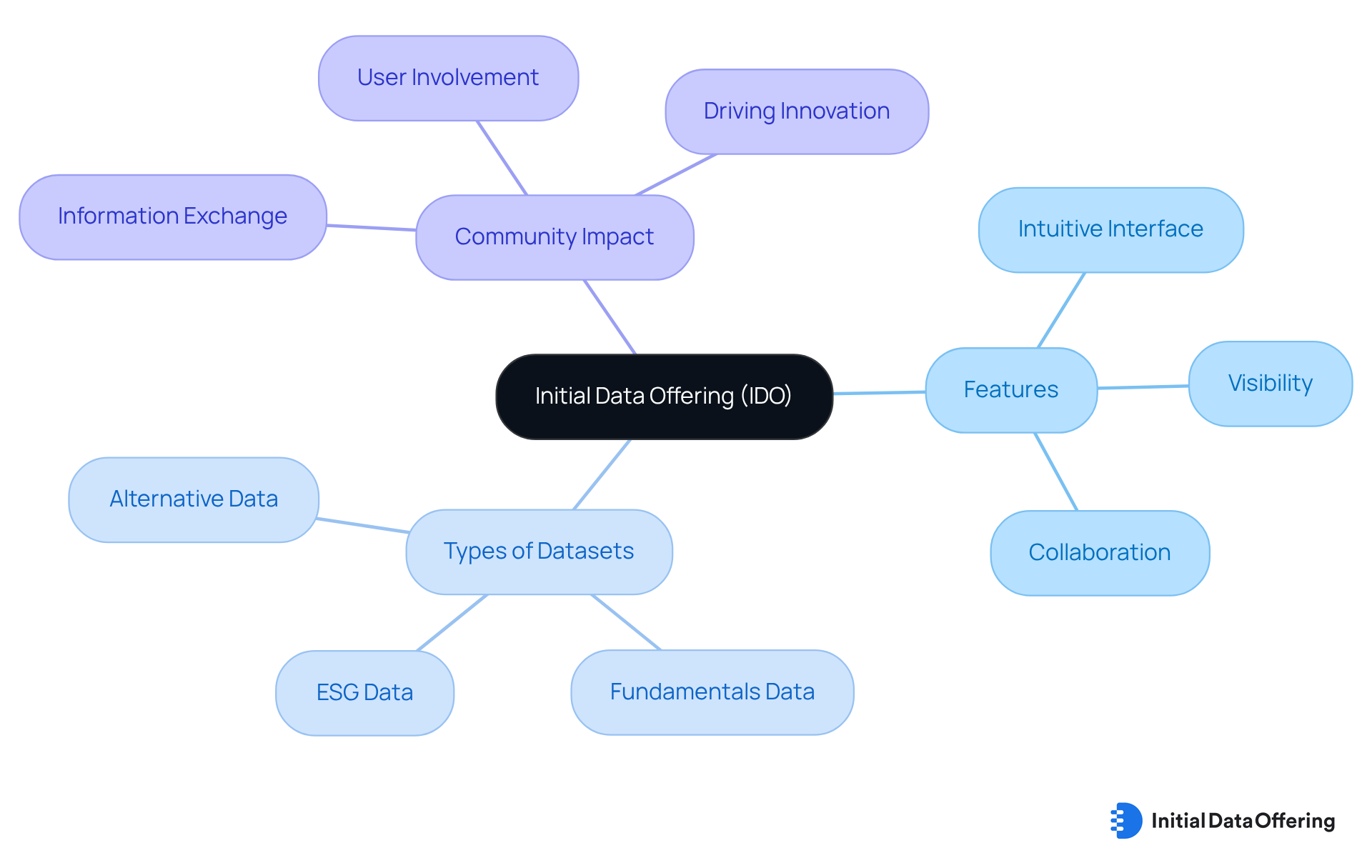
Data Quality and Reliability: Ensuring Accurate Insights in Market Research
In the realm of market research, the quality and reliability of information are paramount. Users must ensure that the datasets they utilize are accurate and up-to-date to derive meaningful insights. Research indicates that surveys with response rates exceeding 70% yield information that is up to 25% more dependable. This statistic underscores the significance of high-quality information. IDO emphasizes the importance of information quality by vetting submissions and urging providers to uphold high standards. By prioritizing reliable datasets, businesses can make informed decisions that positively impact their market positioning and strategy.
Moreover, organizations can forfeit an average of $15 million annually due to low-quality information, highlighting the financial consequences of quality issues. As Sarah Lee states, "Trustworthy information is directly linked to enhanced strategic decisions, reduced risk, and improved ROI." By concentrating on the five essential principles for handling information—accuracy, completeness, consistency, uniqueness, and timeliness—IDO enables organizations to navigate the complexities of the data market. This focus allows them to make informed choices that enhance their competitive advantage.
Consider how the quality of information impacts your organization. Are your datasets meeting the required standards? By ensuring high-quality information, businesses not only safeguard their financial resources but also foster better strategic decision-making. This proactive approach can lead to improved outcomes and a stronger market position.
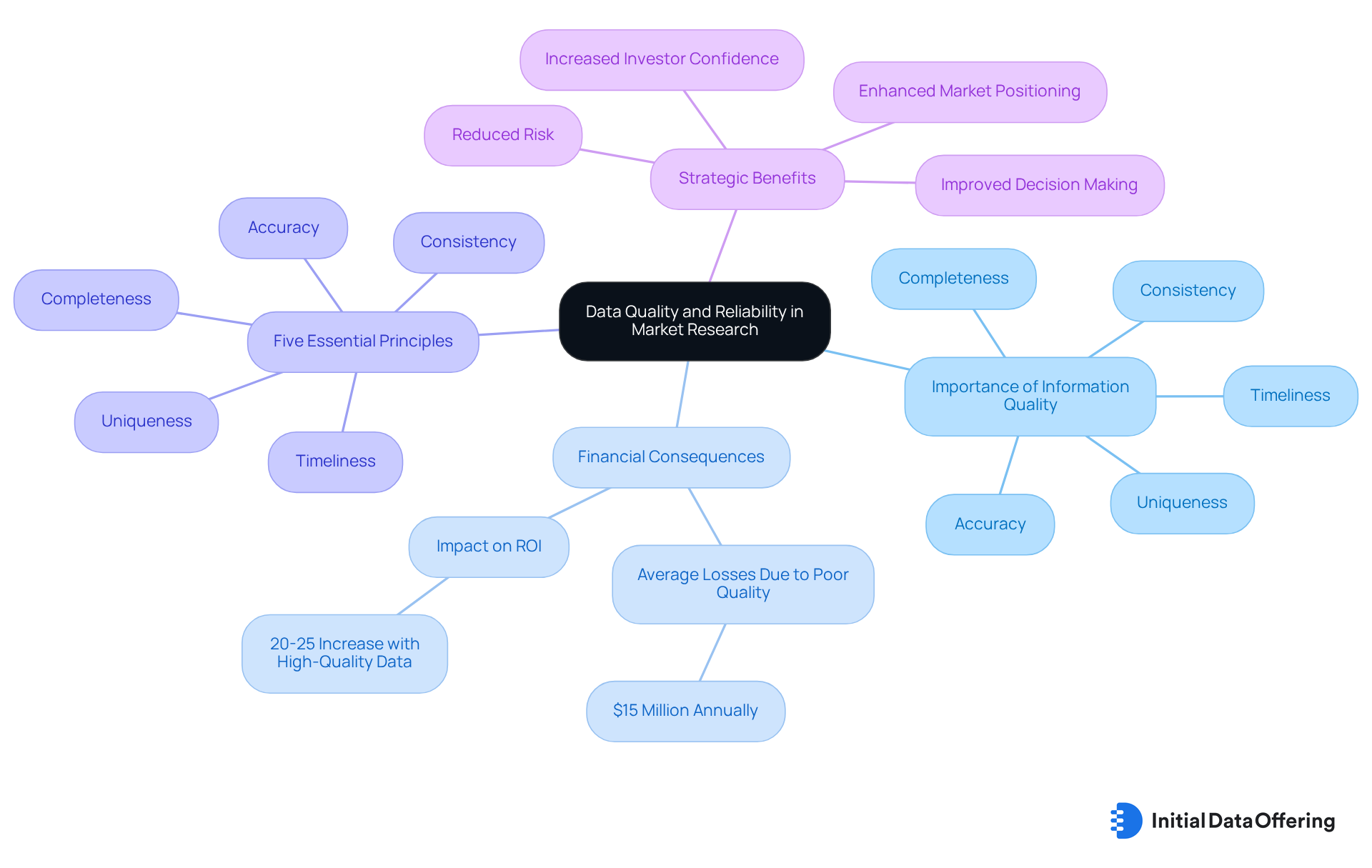
Big Data Integration: Merging Traditional and Modern Research Approaches
Combining large information sets with conventional research methods significantly enhances the analysis of the industry. This integration of numerical data from extensive sources and qualitative insights from traditional approaches allows businesses to achieve a comprehensive understanding of consumer behavior and market dynamics. The advantage of this combined approach is the ability to conduct more robust analyses, which enables companies to identify opportunities and challenges with greater precision.
For instance, studies indicate that organizations leveraging extensive analytics can realize a notable increase in actionable insights compared to those relying solely on conventional research methods. Furthermore, industry leaders underscore the necessity of merging quantitative and qualitative data to facilitate effective decision-making.
In this context, IDO plays a crucial role by providing a diverse array of data that meets both conventional and contemporary research needs, empowering companies to make informed choices based on a well-rounded perspective.
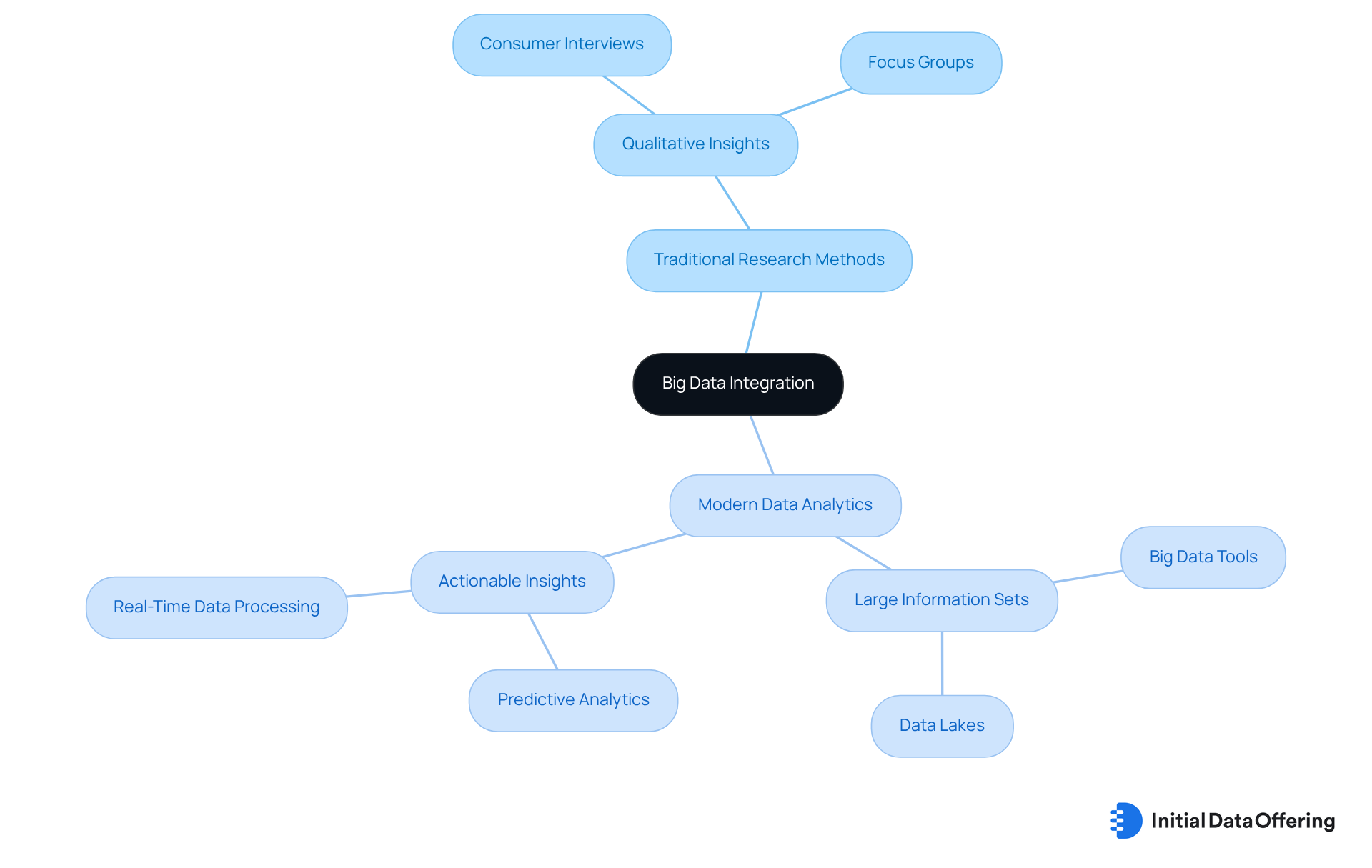
Advanced Analytics Techniques: Unlocking Insights from Complex Data
Advanced analytics techniques, particularly machine learning and predictive modeling, are pivotal in extracting valuable insights from complex datasets. These methodologies empower businesses to discern patterns, anticipate trends, and make informed, data-driven decisions. For instance, organizations utilizing machine learning have reported substantial enhancements in their research capabilities, allowing them to secure a competitive edge. Notably, 65% of companies planning to adopt machine learning believe it will enhance their decision-making processes, and 74% view machine learning and AI as transformative technologies for their jobs and industries.
The integration of machine learning into data analysis not only streamlines operations but also enriches understanding of consumer behavior and market dynamics. As businesses progressively acknowledge the potential of these technologies, the demand for high-quality data in the data market, such as that provided by IDO, continues to rise. In fact, 59% of organizations view accelerated investments in AI and machine learning as a strategy for future-proofing their business. By facilitating access to varied data collections, IDO supports users in harnessing advanced analytics to unlock deeper insights, ultimately driving strategic initiatives and fostering innovation across industries.
To improve your machine learning projects, consider utilizing IDO's curated collections to gain a competitive advantage in your research efforts.
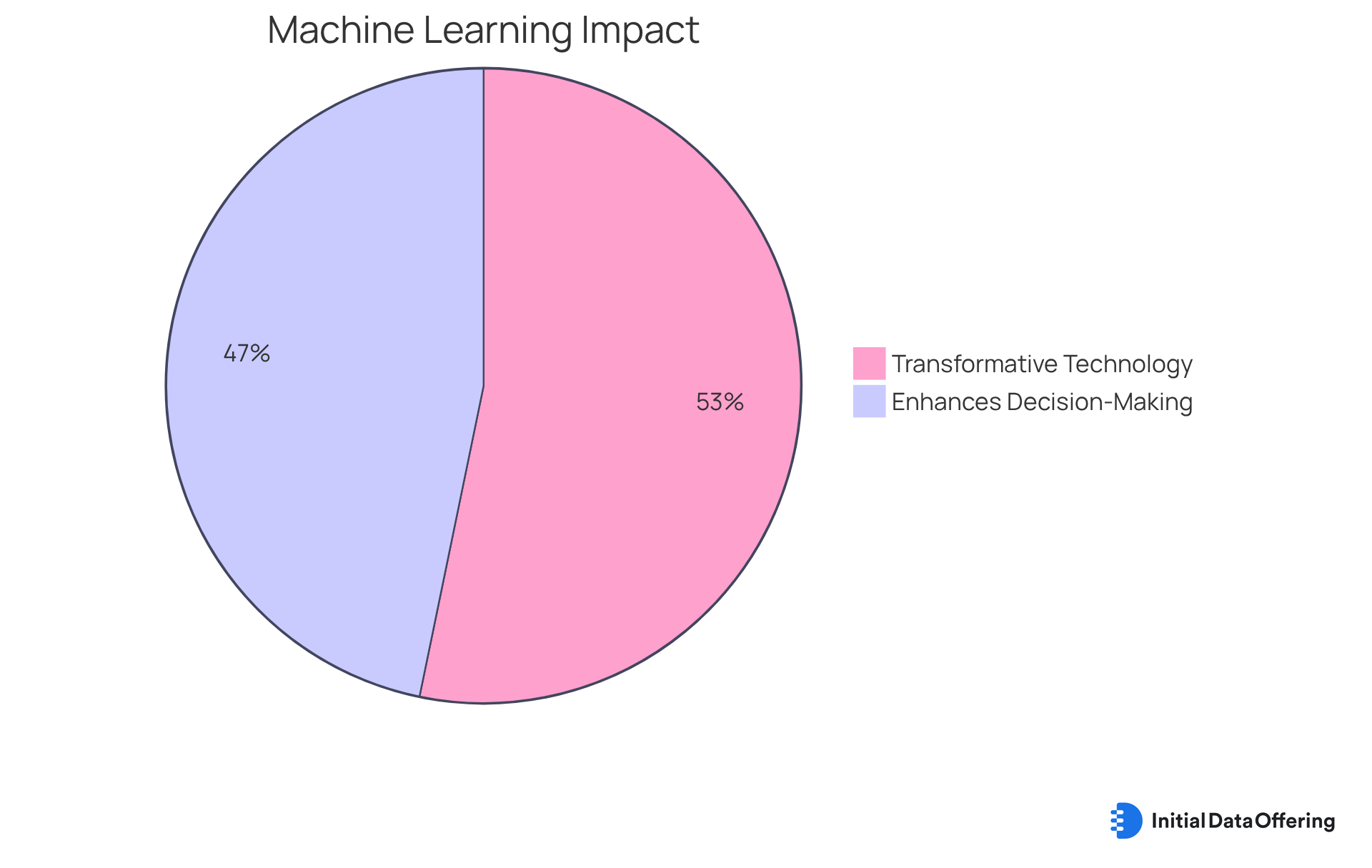
Ethical Standards and Data Privacy: Navigating Compliance in Data Usage
Navigating ethical standards and privacy regulations is essential for companies utilizing datasets in research. Compliance with laws such as GDPR and CCPA not only safeguards consumer privacy but also builds trust, which is increasingly vital in today's data-driven landscape. For instance, 83% of consumers are willing to pay extra for brands that demonstrate verifiable ethical practices, underscoring the market value of transparency and accountability. Moreover, 91% of organizations recognize the necessity to reassure customers regarding information usage with generative AI, highlighting the growing significance of transparency in information practices.
IDO actively promotes ethical information practices by encouraging providers to adhere to these standards, fostering a responsible marketplace. This commitment to ethical adherence aids enterprises in mitigating risks associated with information breaches, which can expose personal details in 44% of cases, leading to substantial financial setbacks and reputational damage. Security breaches cost organizations millions annually, emphasizing the financial implications of inadequate information privacy practices.
Furthermore, organizations that prioritize information privacy are better positioned to enhance their reputation and customer loyalty. As 91% of companies acknowledge the benefits of investing in privacy, integrating ethical considerations into information strategies becomes imperative. By navigating the complexities of GDPR and CCPA compliance, companies can not only protect consumer information but also leverage ethical practices to stimulate innovation and strategic planning in their market research efforts. Additionally, 75% of consumers will not engage with organizations they do not trust with their data, reinforcing the critical connection between ethical data practices and consumer trust.
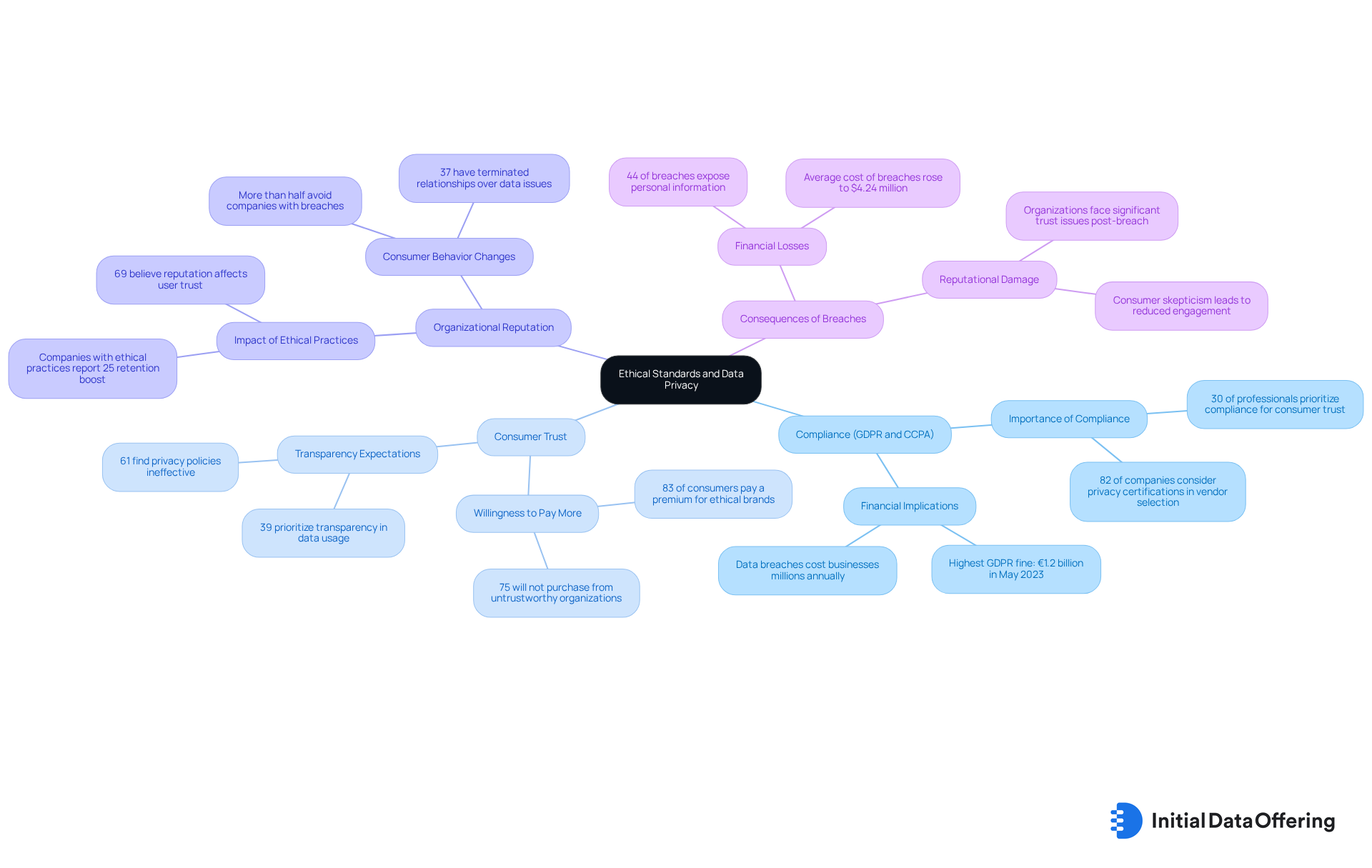
Customer Segmentation and Personalization: Targeting Consumer Needs Effectively
Effective customer segmentation and personalization are crucial for companies striving to meet consumer needs. By analyzing data collections from the data market that reveal insights into demographics, preferences, and behaviors, organizations can tailor their marketing strategies to specific segments. IDO offers a variety of datasets that facilitate this analysis. These datasets enable companies to create personalized experiences that resonate with their target audience. This targeted approach not only enhances customer satisfaction but also fosters loyalty and boosts sales.
What features do these datasets provide? They offer in-depth insights that allow businesses to understand their customers better. The advantages of utilizing such data include the ability to craft marketing strategies that are not only relevant but also impactful. Ultimately, the benefit is clear: businesses can engage their customers more effectively in the data market, leading to improved outcomes.
Consider how these datasets can be applied in your work. For instance, organizations can leverage demographic insights to segment their audience more accurately. By doing so, they can develop targeted campaigns that speak directly to the needs and preferences of each segment. This approach not only drives engagement but also enhances the overall customer experience.
In conclusion, effective customer segmentation and personalization through data analysis are essential for driving business success in the data market. By utilizing IDO's datasets, companies can create meaningful connections with their audience, ultimately leading to increased satisfaction, loyalty, and sales.
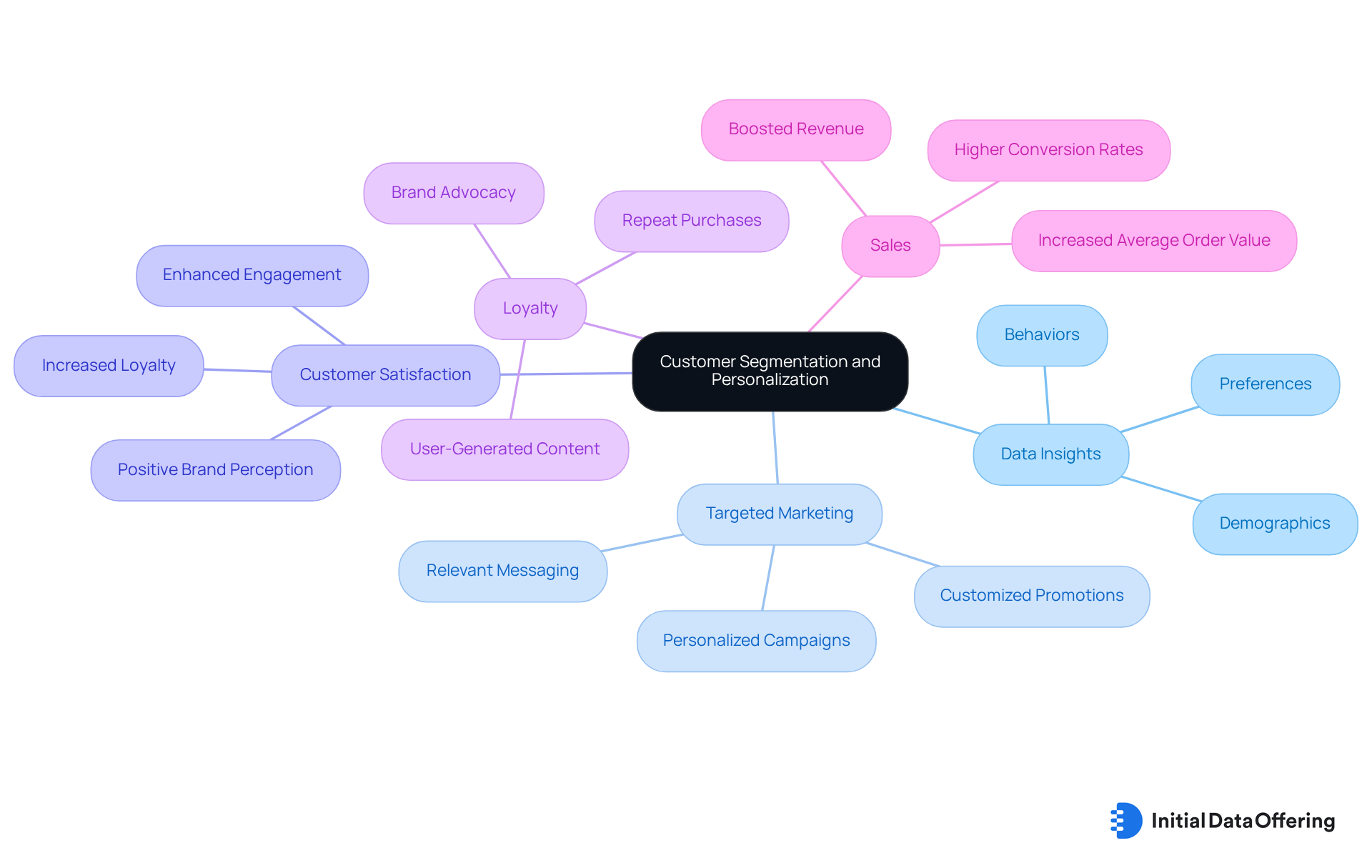
Challenges in Big Data Market Research: Identifying and Overcoming Barriers
The environment of large data market research presents numerous obstacles, notably information overload, integration issues, and the necessity for specialized skills. Recent studies indicate that approximately 70% of enterprises report challenges related to information overload, which can hinder effective decision-making and research activities.
To address these challenges, organizations must implement targeted strategies. For instance, utilizing platforms like IDO allows businesses to access curated collections of information, thereby streamlining the research process and mitigating the difficulties associated with large-scale datasets. Additionally, investing in training and tools is crucial for equipping teams with the skills needed to navigate these challenges effectively.
As Dr. Jennifer Priestley emphasizes, continuous education in analysis is vital for maximizing the potential of insights derived from information. By directly addressing these obstacles, including the reliance on 'HiPPOs' (Highest Paid Person's Opinion) for decision-making, organizations can enhance their research outcomes and foster informed decision-making.
Notably, the large information sector, which is a significant part of the data market, is projected to grow by 20% this year, underscoring the importance of managing information overload.
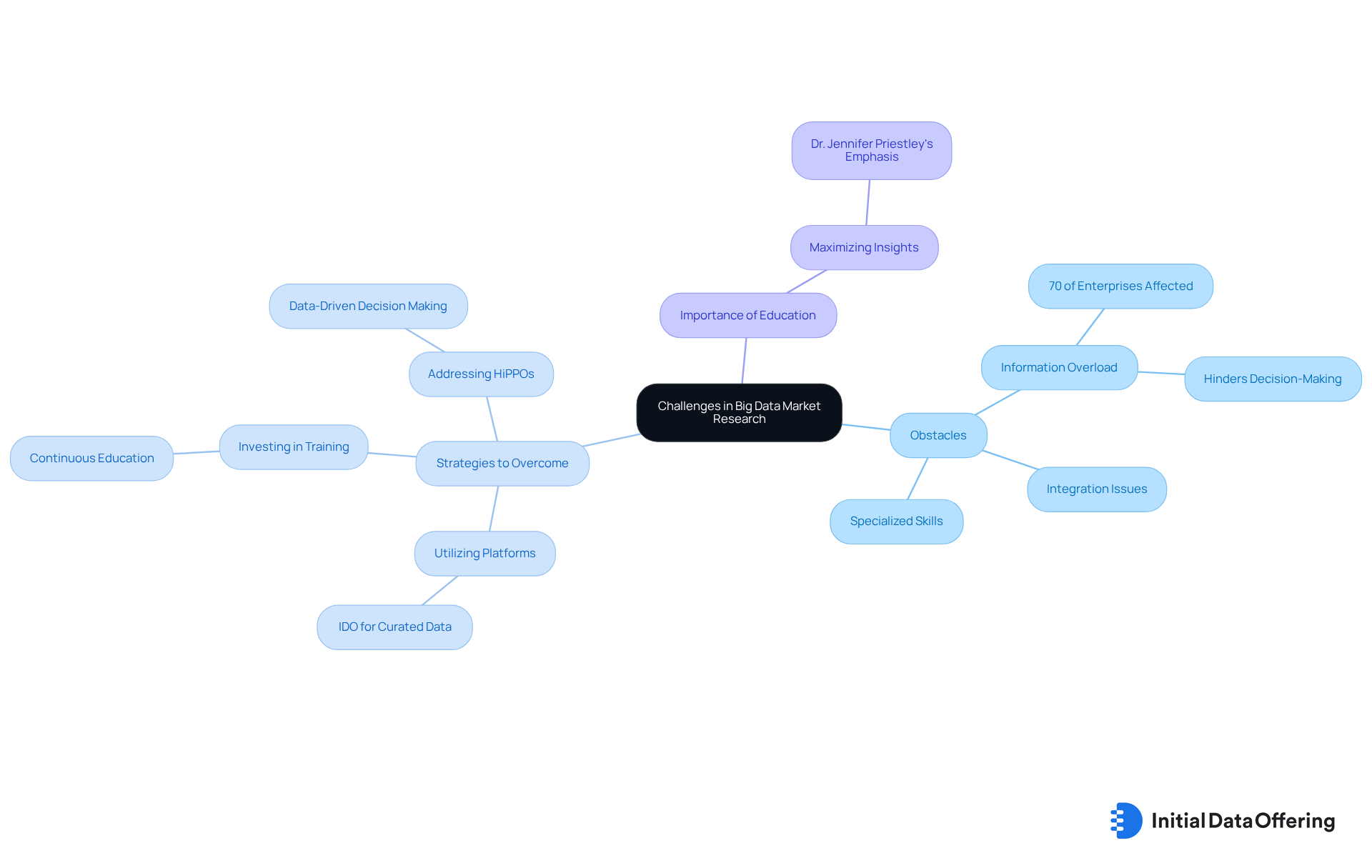
Evolving Consumer Expectations: Adapting Data Strategies to Market Trends
Consumer expectations are rapidly evolving, influenced by technological advancements and shifting market dynamics. To stay competitive, companies must adjust their information strategies to align with these trends. For instance,
- 73% of customers now expect better personalization in their interactions,
- yet 61% feel that most companies treat them as mere numbers.
This gap emphasizes the necessity for organizations to utilize information that reflects current consumer behaviors and preferences, enabling informed decision-making that resonates with their audience's needs.
IDO provides access to a diverse array of datasets, enabling companies to stay ahead of these trends. By utilizing real-time information analytics, companies can make timely decisions, with
- 80% reporting revenue uplift from this approach.
Additionally, as consumer behavior progressively transitions towards online interaction, companies that improve their digital presence experience a
- 30% greater retention rate.
Examples abound of companies reacting efficiently to industry trends through information insights. A mid-sized fashion retailer, for instance, revamped its online strategy based on consumer preferences for sustainable products, leading to improved conversion rates and customer loyalty. Such data-driven strategies are essential for navigating the complexities of today's commercial environment and succeeding in the data market, ensuring that businesses not only meet but exceed evolving consumer expectations.
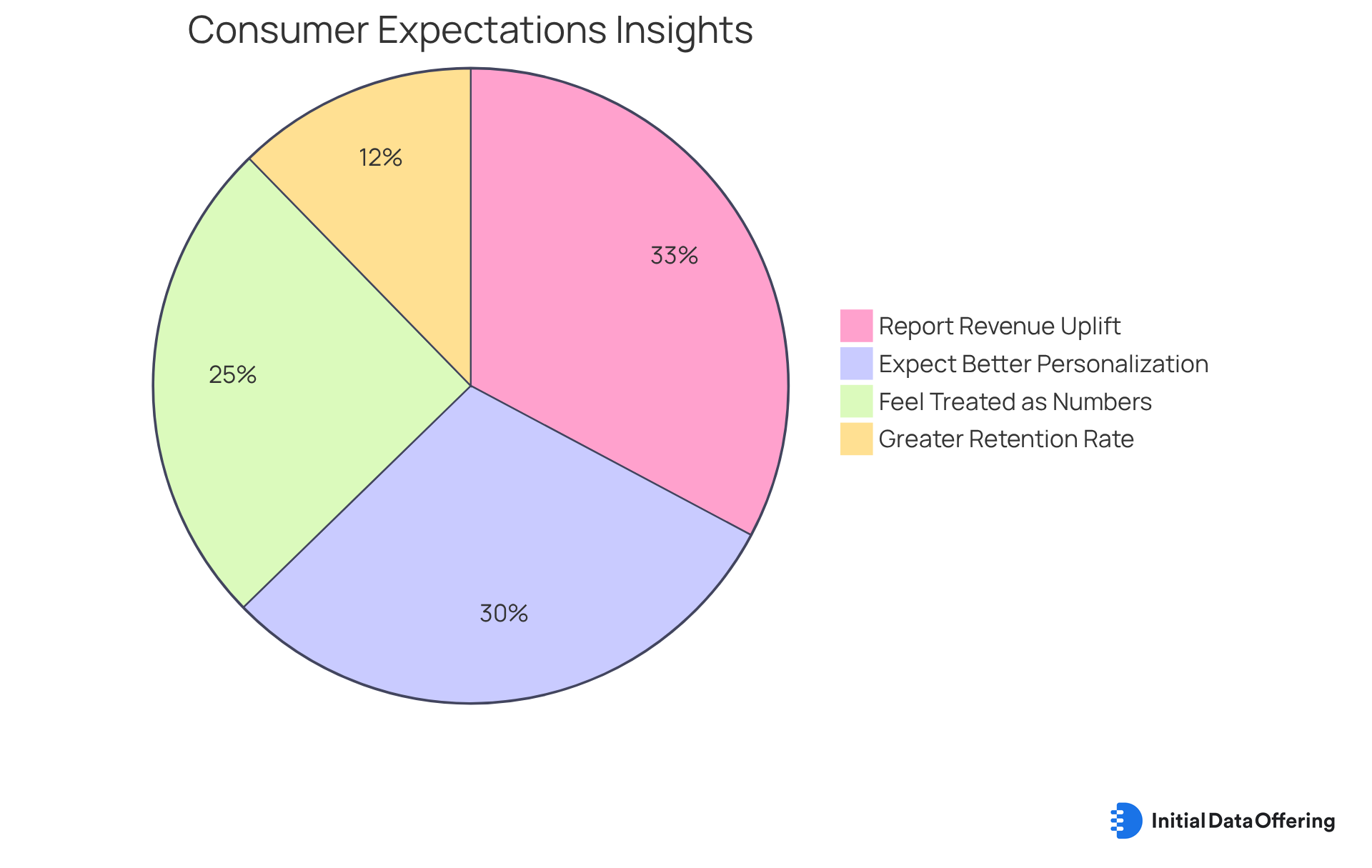
The Future of Big Data in Market Research: Trends to Watch
The future of large information in industry research is poised for significant transformation, driven by trends such as artificial intelligence, real-time analytics, and enhanced automation. Companies embracing these innovations will be better positioned to leverage information for strategic decision-making. IDO stands at the forefront of these trends, consistently updating its platform to equip users with access to the latest datasets and analytical tools that mirror the evolving landscape of market research.
A recent study reveals that over 60% of organizations are integrating AI into their analytics processes, underscoring the growing shift towards insight-driven conclusions. This integration empowers companies to analyze extensive data in real-time, enabling swift identification of trends and consumer behaviors. As Leonardo Heringer, Global Digital Insights Manager at L'Oréal, articulated, "Digital insights provide us with reach and speed," which is crucial for effectively adapting to industry changes.
Leading companies like L'Oréal have adeptly utilized AI-driven insights to monitor emerging trends and adjust their strategies accordingly. By democratizing access to consumer insights across departments, they have fostered collaboration and expedited decision-making processes. IDO supports this initiative by offering a robust data market for high-quality datasets, which includes Alternative Data, Fundamentals Data, and ESG Data. As the adoption of AI in research continues to escalate, organizations leveraging these tools will secure a competitive edge, driving innovation and informed strategies within their respective sectors.
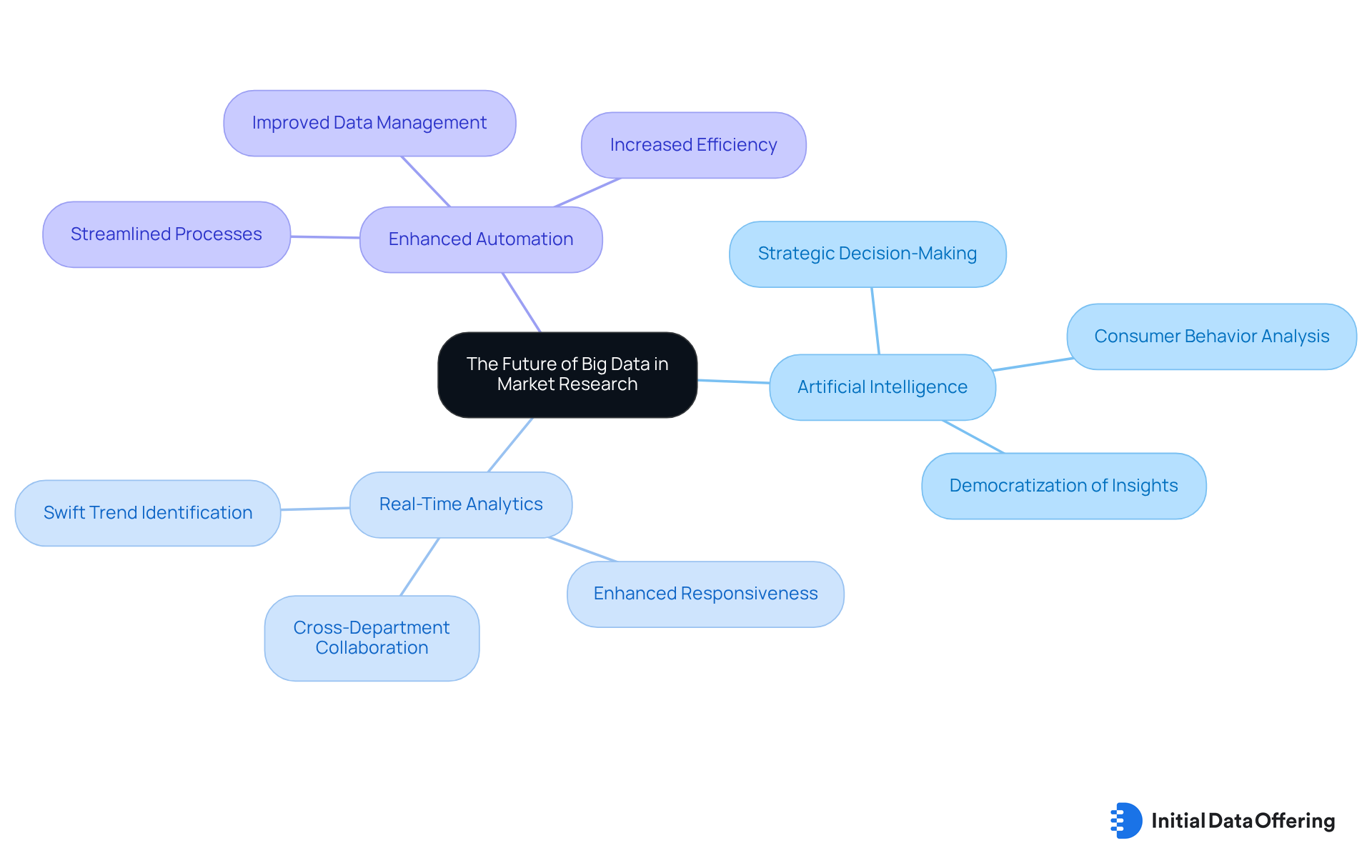
Comprehensive Data Integration: Enhancing Market Research Capabilities
Thorough data integration serves as a cornerstone for enhancing research capabilities. By merging information from diverse origins, companies can cultivate a comprehensive understanding of industry trends and customer behavior. How can varied data collections unveil hidden patterns and trends? Organizations that leverage such data can achieve more precise forecasts and make strategic choices. A compelling case study titled 'The Power of Merging Information Sources for Deeper Consumer Insights' demonstrates that integrating multiple information sources significantly enriches consumer understanding in the data market, providing brands with a clearer perspective on market dynamics.
IDO facilitates this integration by offering a wide array of datasets, refreshed daily, that are readily accessible for analysis. Statistics reveal that organizations employing descriptive analytics have witnessed substantial improvements in their research outcomes. Companies prioritizing comprehensive data integration not only enhance their operational efficiency but also improve their ability to compete in the data market and derive actionable insights. This strategic approach empowers them to make informed decisions that propel success in their respective markets, ultimately leading to improved outcomes and competitive advantages.
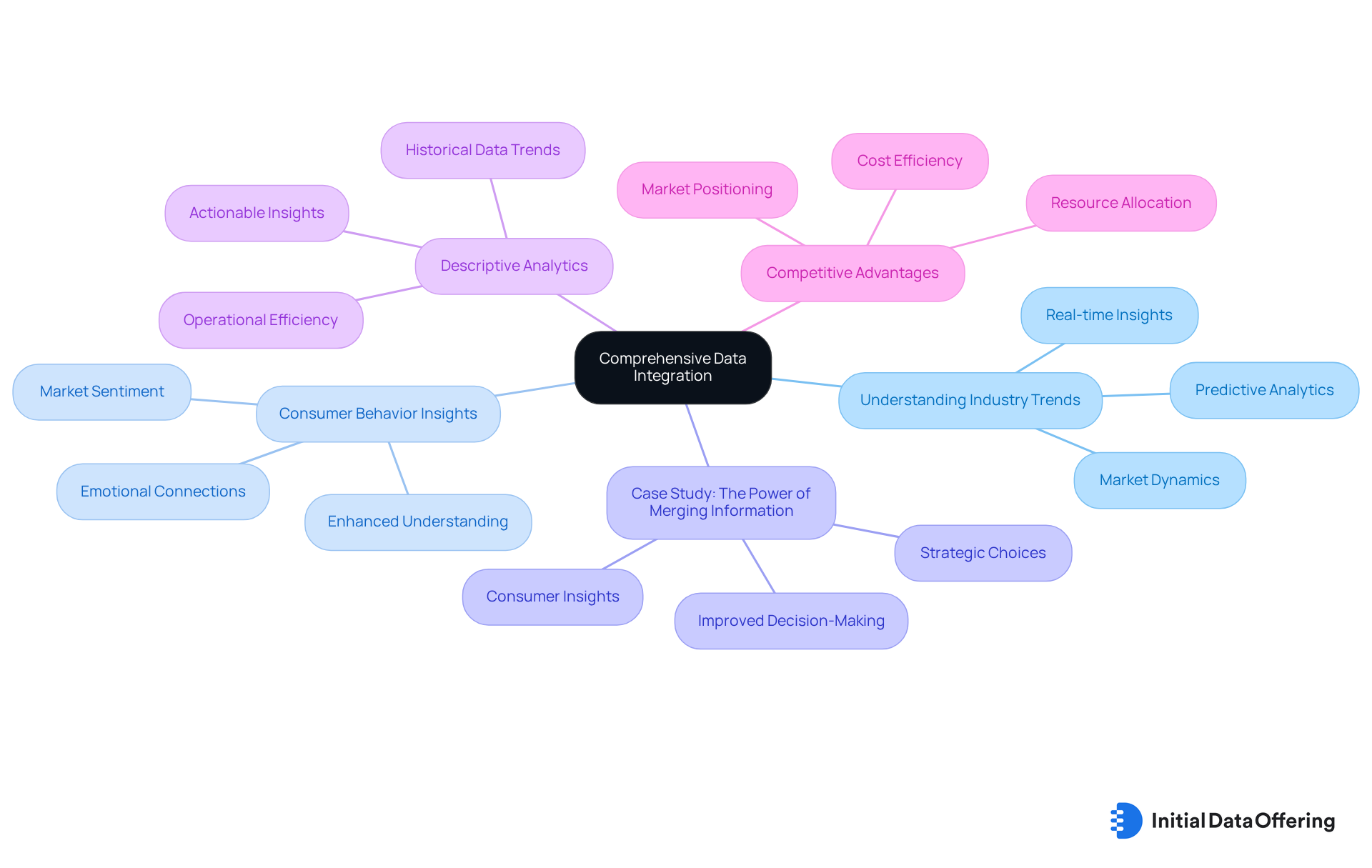
Conclusion
Navigating the data market effectively necessitates a multifaceted approach that integrates innovative strategies, high-quality datasets, and ethical practices. The significance of platforms like the Initial Data Offering (IDO) emerges as essential hubs for discovering unique datasets, fostering collaboration, and enhancing access to valuable information. By bridging the gap between data providers and users, IDO simplifies the search for relevant data while promoting a community-centric environment that drives innovation and informed decision-making.
Key insights emphasize the importance of:
- Data quality
- The integration of traditional and modern research methods
- The adoption of advanced analytics techniques
Organizations prioritizing high-quality data can mitigate risks, enhance their market positioning, and make strategic decisions that yield positive financial outcomes. Furthermore, understanding evolving consumer expectations and adapting data strategies to meet these demands is crucial for maintaining a competitive edge in the rapidly changing market landscape.
Ultimately, embracing these strategies and best practices is vital for businesses aiming to thrive in the data market. As the landscape continues to evolve, organizations should actively seek out high-quality datasets, invest in advanced analytics, and adhere to ethical standards in data usage. By doing so, they unlock deeper insights, foster trust and loyalty among consumers, and ensure sustainable growth and success in an increasingly data-driven world.
Frequently Asked Questions
What is the Initial Data Offering (IDO)?
The Initial Data Offering (IDO) is a platform designed for users to discover unique datasets across various fields. It connects data providers and buyers, facilitating the discovery of tailored collections of high-quality information.
What types of datasets are available on IDO?
In 2025, IDO features thousands of unique datasets, including Alternative Data, Fundamentals Data, and ESG Data, which empower users to gain valuable insights across diverse sectors.
How does IDO enhance the decision-making processes for users?
IDO enhances decision-making by fostering community involvement and collaboration, which allows for effective information exchange and helps users navigate the fragmented data market.
Why is data quality and reliability important in market research?
Data quality and reliability are crucial because accurate and up-to-date datasets lead to meaningful insights. High-quality information can significantly impact strategic decisions and financial outcomes for businesses.
How does IDO ensure the quality of the datasets it provides?
IDO emphasizes information quality by vetting submissions and encouraging data providers to maintain high standards, focusing on accuracy, completeness, consistency, uniqueness, and timeliness.
What are the financial consequences of using low-quality information?
Organizations can lose an average of $15 million annually due to low-quality information, which underscores the importance of using trustworthy datasets for strategic decision-making.
How does big data integration benefit businesses?
Merging large information sets with traditional research methods enhances the analysis of consumer behavior and market dynamics, allowing for more robust analyses and better identification of opportunities and challenges.
What role does IDO play in big data integration?
IDO provides a diverse array of data that meets both conventional and contemporary research needs, empowering companies to make informed decisions based on a comprehensive understanding of the market.